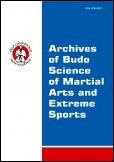2020, Volume 16, Issue 1
Students' attitudes towards survival competencies before and after Covid-19 lockdown
Robert Bąk1
1College of Medical Sciences Institute of Physical Culture Studies, University of Rzeszow, Rzeszów, Poland
Author for correspondence: Robert Bąk; College of Medical Sciences Institute of Physical Culture Studies, University of Rzeszow, Rzeszów, Poland; email: robo@interia.pl
Full text
Abstract
Background and Study Aim: Survival competencies should be one of the most elementary practical human skills. However, these competencies are not common both among contemporary young people and qualified adults. In 2020, societies around the world faced a new threat. This time it was a health-related threat – the Covid-19 pandemics. Lockdown, which was commonly used as one of the most important measures to fight the virus, has brought everyone before a new challenge – how to survive isolation. The main aim of the study was to provide the knowledge about attitudes of students towards survival competences before and after lockdown and whether isolation modifies these attitudes.
Material and Methods: Forty-four students (20 females, 24 males) of the University of Rzeszów took part in a questionnaire survey and an observation of survival classes conducted by the author. The first group (“before”, BF code: 9 women, 12 men) was evaluated in 2019, while the second one was surveyed in 2020, one year after the Covid-19 lock-down (“after”, AF code: 11 women, 12 men). In the questionnaire, the students stated i.a. the level of their survival competences, their motivation for the class, and their interest in this type of training. Their actual competences among Five Basic Survival Skills were assessed during a direct observation.
Results: Both groups declared to have comparable, relatively low competencies related to survival skills. Group AF declared to be more motivated to participate in classes and to have a significantly greater demand for survival training As far as competences among Five Basic Survival Skills are concerned, the group AF obtained higher results. Students in the AF group claimed that lockdown had significantly contributed to their interest in survival competency courses.
Conclusions: As far as competences among Five Basic Survival Skills are concerned, the group AF obtained higher results. Students in the AF group claimed Isolation of students due to Covid-19 lockdown has increased their awareness of how necessary survival skills are. It has also substantially raised their motivation to participate in classes, thereby positively impacting effectiveness and interest in such trainings.
Key words: Five Basic Survival Needs, physical education in uniformed services, survival awareness, survival skills





